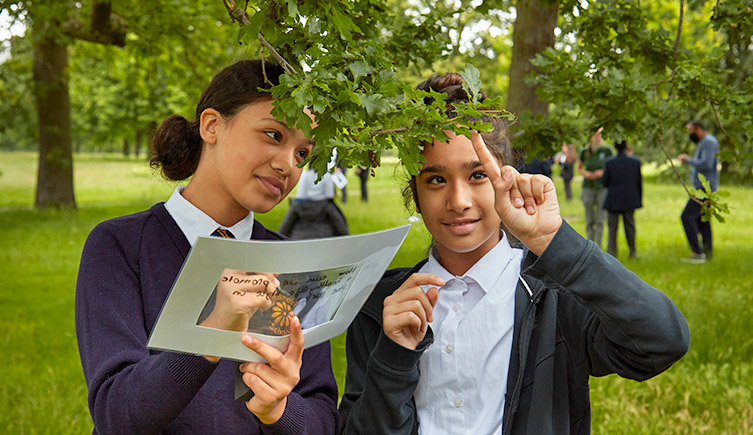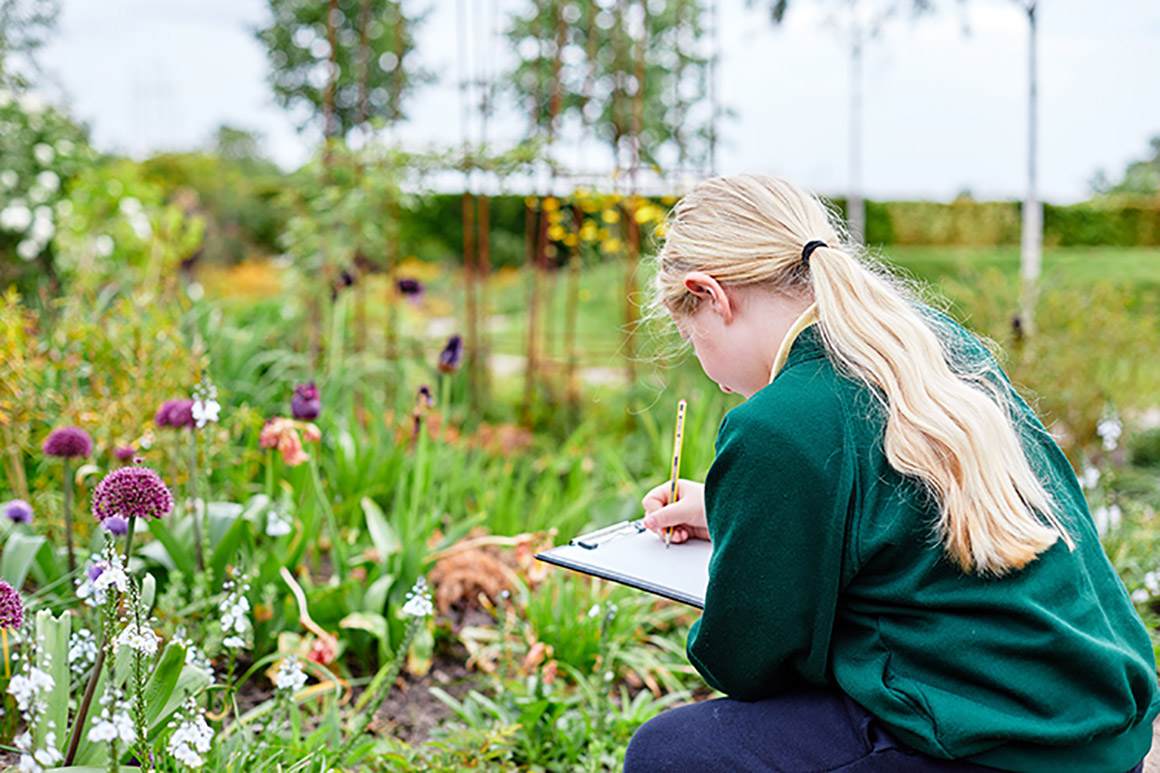Get involved
Register for the programme on the Nature Park website.
Get in touch at hello@educationnaturepark.org.uk

The Natural History Museum is leading a partnership that has developed the National Education Nature Park, commissioned as part of the Department for Education's Sustainability and Climate Change Strategy.
This free programme for all schools, nurseries and colleges in England inspires confidence in children and young people to make a positive difference to both their own and to nature’s future.
Together with our partners including the Royal Horticultural Society and others, we have developed a curriculum-linked programme that sees educators and learners follow a five-step process to transform their sites for both people and wildlife, creating a network of green spaces that form the National Education Nature Park.
With children and young people leading the way in this process, it nurturesa connection to nature and develops vital skills for their futures, all while boosting biodiversity across the country.
Using digital tools from Esri UK, learners map out the habitats on their sites to understand their starting point and identify areas of opportunity.
They collectively decide on habitat improvements – from installing green walls and digging ponds, to growing pollinator-friendly plants and building bug hotels – and work together to make those changes.
This world-leading programme is also a big community science project. School grounds are one of the most under-recorded urban habitat types, so by taking part, young people are collaborating with Natural History Museum scientists on trailblazing scientific research into what’s currently living and growing on school grounds, and how we can best improve them for wildlife.
Underpinning the programme is a vast library of free, curriculum-linked resources that aim to put climate and nature at the heart of education across all subject areas.
All the learning resources available on the National Education Nature Park website can be delivered within your existing curriculum teaching, supporting quality-assured biodiversity and climate education at the same time as national curriculum learning.
Since the programme launched in October 2023, over 4,000 schools, colleges and nurseries across all regions of England have got involved. Read the Nature Park Annual Report 2023/24 to explore the full story.
At Co-op Academy Manchester, a secondary school with over 1,600 pupils, students have worked to develop a living wall to help transform their playground from a grey space to a greener one.
Students noticed that there was a completely grey, concreted area of their school grounds outside a technology classroom that gets very hot in summer. Seeing the potential of this space, students used the Nature Park programme to help them to decide to install a green wall. The south-facing space is perfect for plants as it gets sun all day, and the living wall will help shade and cool the technology classroom.
The green wall is already transforming staff and student experiences of the school grounds. Staff members have been commenting on how nice it is to see the wall first thing when they arrive at school in the morning, students have a greener space to be in and everyone is looking forward to seeing the difference it makes through shade and cooling each summer.
Co-op Academy have used thermal imaging cameras to demonstrate how effective planting and greenery can be as a strategy for mitigating the overheating of south-facing rooms and buildings. In physics lessons, the camera has shown that there can be over a 10°C difference between the surface temperature of the cladding on the building compared to the planting in the vertical system.
Visit the National Education Nature Park website to register to join, and access a library of free, quality-assured, curriculum-linked resources that embed nature and climate education across all subject areas.

Register for the programme on the Nature Park website.
Get in touch at hello@educationnaturepark.org.uk
Commissioned by the Department for Education, this partnership is led by the Natural History Museum with the Royal Horticultural Society, supported by the Royal Society, Royal Geographical Society (with IBG), Manchester Metropolitan University, Learning Through Landscapes, UK Centre for Ecology and Hydrology and the National Biodiversity Network Trust.
Collectively we are the UK’s leading institutions within our fields, with world class expertise and brand recognition across schools and Higher Education, science research, and public engagement with nature. Esri UK is the geospatial technology partner in the programme, providing the digital mapping platform and expertise in biodiversity mapping.
We are working alongside our ‘sister’ projects who are also part of the Department for Education’s Climate Change and Sustainability Strategy and alongside the Nature Park, aim to support settings with the development of Climate Action Plans. These projects are Climate Ambassadors, Sustainability Support for Education and Let's Go Zero Climate Action Advisors.
As the programme develops, we will continue to work in partnership with the environment and education sector, universities, and scientists to pool our expertise and resources to provide the support that educators and students want.
The National Education Nature Park is part of the Museum's Urban Nature Movement. We thank all our funders to the Urban Nature Movement, and in particular express our gratitude to Elgol Fund for Nature and Tioc Foundation.

Press release
Today, on Outdoor Classroom Day, young people involved in a pilot scheme for the National Education Nature Park took part in an activity day to test activities they will undertake in their places of education to help boost biodiversity across England